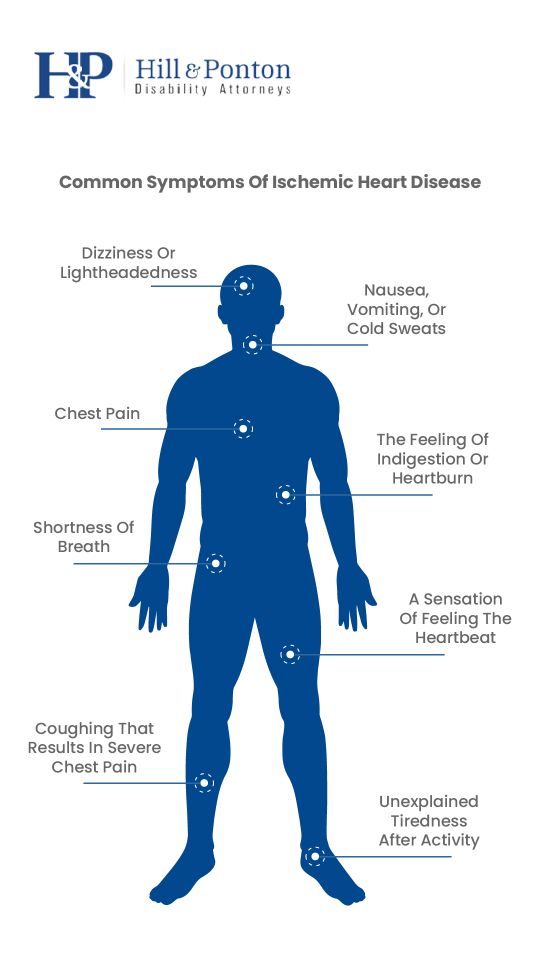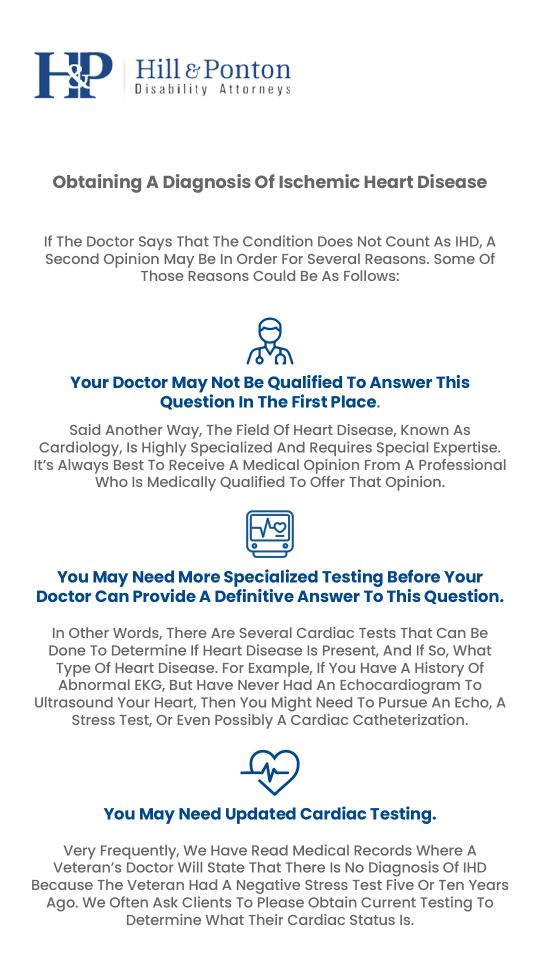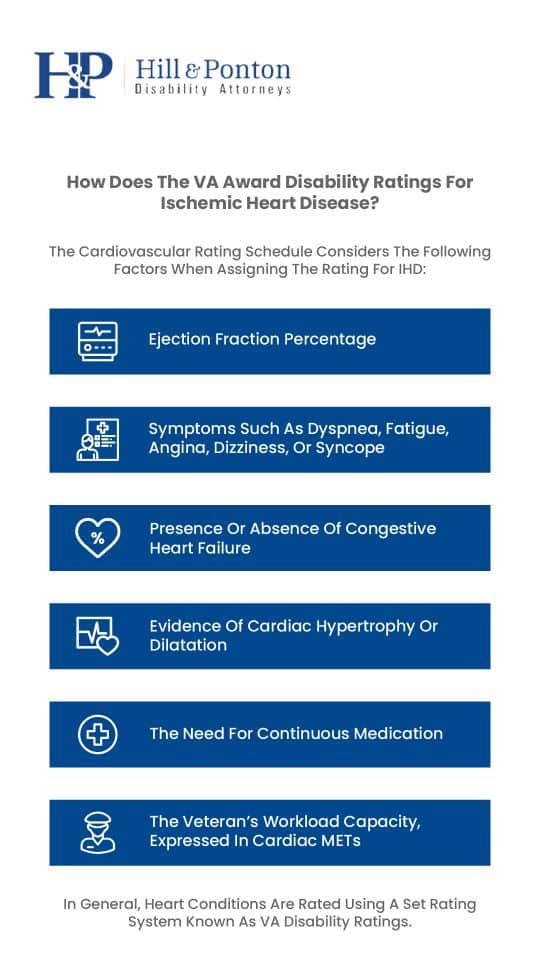For several years, the VA has acknowledged that veterans who served in the Republic of Vietnam between 1962 and 1975 were likely exposed to tactical herbicides such as Agent Orange.
The U.S. Department of Veterans Affairs mandates that any veteran who served in Vietnam (or, now, in some other areas where Agent Orange was stored or sprayed) during the relevant time period is presumed to have Agent Orange exposure.
The VA has identified a list of diseases that it accepts as having been caused by Agent Orange.
If a military service member who has been exposed is affected by one of these diseases, it is presumed to have been caused by his exposure to Agent Orange and will, then, be considered service-connected.
In 2010, the VA expanded its list of twelve Agent Orange-related diseases to include Parkinson’s disease, chronic B-cell leukemia, and ischemic heart disease.
We will focus on ischemic heart disease in this blog post.
What is Ischemic Heart Disease?
Ischemic heart disease involves a reduction of blood flow and oxygen to the heart, which results in the heart muscle not getting enough blood and oxygen.
Usually, there is a buildup of cholesterol and other substances, called plaque, in the arteries that bring oxygenated blood to the heart muscle.
Over time, ischemic heart disease damages and weakens the heart muscle, making it very difficult for the heart to fill and pump blood to the rest of the body.
Ischemic heart disease is a common cause of congestive heart failure. Veterans with this condition may, at one time, have had a heart attack, angina or chest pains, unstable angina, or sudden and increasingly worsening chest pains.
Often, veterans with ischemic heart disease may not have noticed any previous symptoms.

Common Symptoms of Ischemic Heart Disease
Some common symptoms of ischemic heart disease include:
- Chest pain behind the breastbone or slightly to the left of it (it may feel like heavy pressure, squeezing, or crushing pain) The pain may spread to the neck, jaw, back, shoulder, or arm
- Dizziness or lightheadedness
- The feeling of indigestion or heartburn
- Nausea, vomiting, or cold sweats
- A sensation of feeling the heartbeat
- Shortness of breath
- Unexplained tiredness after activity
- Coughing that results in severe chest pain
It’s important to note that a veteran does not have to experience all of these symptoms to prove service connection.
Ischemic Heart Disease as a Presumptive Condition
Not all heart disease qualifies for the presumption, but just because a veteran has not explicitly been diagnosed with Ischemic Heart Disease does not mean that he does not have the condition. Ischemic Heart Disease includes coronary artery disease, coronary heart disease, ischemic cardiomyopathy, and myocardial ischemia. The vete
ran may or may not have the initial symptoms listed above. Vietnam-era veterans with heart disease should ask their doctors if their particular diagnosis is a form of Ischemic Heart Disease.
Importantly, so long as the veteran was exposed to Agent Orange (either directly or presumptively) during active duty, he need not have been diagnosed with Ischemic Heart Disease within any certain time frame.
This exposure is very common for Vietnam veterans In other words, if a veteran served in the Vietnam war in 1969 and develops Ischemic Heart Disease forty years later in 2009, he is still entitled to service connection for his health conditions.
The Blue Water Navy Vietnam Veterans Act extended eligibility to Vietnam war veterans. In addition, although there are other risk factors for Ischemic Heart Disease, such as smoking, obesity, high cholesterol, hypertension, and diabetes mellitus, if the veteran has been exposed to Agent Orange, he is entitled to a presumption of service connection even if he has those other risk factors.
In addition to new claims for Ischemic Heart Disease, the VA must also reopen and re-adjudicate the claims of Vietnam-era veterans who applied for compensation for heart disease prior to the change in the VA regulations.
The veteran could, then, be entitled to an effective date all the way back to his earlier claim.
On that note, medical research is constantly identifying new links and relationships, and veterans should be aware that just because their particular illnesses or diseases have not yet been recognized as being related to Agent Orange does not mean that they will not be recognized at some point in the future.
If the veteran feels that there is a link, it is worth filing the claim.
The claim may initially be denied, but if the VA then later recognizes the veteran’s disability as connected to Agent Orange, he could be entitled to an effective date as of the date he filed his claim.
Obtaining a Diagnosis of Ischemic Heart Disease

The VA has listed the following cardiac conditions as falling within the definition of IHD: acute, subacute, and old myocardial infarction; atherosclerotic cardiovascular disease including coronary artery disease (including coronary spasm) and coronary bypass surgery; and stable, unstable, and Prinzmetal’s angina. 38 C.F.R § 3.309(e).
Notably, the above regulation specifically states that IHD includes, but is not limited to, the specific conditions that are listed.
Therefore, if a veteran has cardiac complaints and has been exposed to Agent Orange, it is important for the veteran to ask their doctor whether their particular diagnosis or condition is in fact a form of Ischemic Heart Disease and/or if their condition falls within the parameters of one of the conditions the VA has already conceded qualifies as a form of IHD.
If the doctor says that the condition does count as IHD, of course, the doctor needs to state that in writing, with a medical rationale.
If the doctor says that the condition does not count as IHD, a second opinion may be in order for several reasons. Some of those reasons could be as follows:
- Your doctor may not be qualified to answer this question in the first place. Said another way, the field of heart disease, known as cardiology, is highly specialized and requires special expertise. If your doctor is not a cardiologist, asking him or her to provide a medical opinion outside the scope of their expertise may not be the best idea. It’s always best to receive a medical opinion from a professional who is medically qualified to offer that opinion.
- You may need more specialized testing before your doctor can provide a definitive answer to this question. In other words, there are several cardiac tests that can be done to determine if heart disease is present, and if so, what type of heart disease. For example, if you have a history of abnormal EKG, but have never had an echocardiogram to ultrasound your heart, then you might need to pursue an echo, a stress test, or even possibly a cardiac catheterization. Until extensive cardiac testing is performed, there is really no way a doctor can validly deny that IHD is present, without doing a full cardiac work-up.
- You may need updated cardiac testing. Very frequently, we have read medical records where a veteran’s doctor will state that there is no diagnosis of IHD because the veteran had a negative stress test five or ten years ago. We often ask clients to please obtain current testing to determine what their cardiac status is. Just because IHD was not present five years ago, doesn’t mean that it isn’t present now. However, without updated testing to establish the presence of IHD, a veteran who may otherwise qualify for benefits, may miss out on service connection, simply because their doctor doesn’t take the extra step to order new tests.
How Does The VA Award Disability Ratings for Ischemic Heart Disease?

Once it is verified that (1) the veteran has been exposed to Agent Orange and (2) the veteran has a valid diagnosis of IHD, the next step is to determine what the rating for the IHD will be. The proper rating for IHD is determined by looking at several factors, per the VA’s Schedule of Ratings for the Cardiovascular System. 38 C.F.R. § 4.104.
The cardiovascular rating schedule considers the following factors when assigning the rating for IHD:
- Ejection Fraction percentage
- Symptoms such as dyspnea, fatigue, angina, dizziness, or syncope
- Presence or absence of congestive heart failure
- Evidence of cardiac hypertrophy or dilatation
- The need for continuous medication
- The veteran’s workload capacity, expressed in cardiac METs (metabolic equivalent). For example, the VA’s Disability Benefits Questionnaire for IHD states that:
In general, heart conditions are rated using a set rating system known as VA disability ratings.
VA Disability Ratings for Ischemic Heart Disease
Here is a brief look at the VA rating schedule for heart disease:
- 100 percent rating. This rating is given to a veteran’s condition if he experiences one or more of the following:
- Consistently experiences congestive heart failure.
- Receives 3 METS or less, and he is short of breath, fatigued, and experiences chest pain, dizziness, and/or fainting.
- Shows left ventricular dysfunction, and the percentage of blood pumped out with each heartbeat is less than 30 percent.
- 60 percent rating. This rating is given to a veteran’s condition if he experiences one or more of the following:
- Two or more episodes of congestive heart failure during the past year.
- A score of 4 or 5 METS and he is short of breath, fatigued, and experiences chest pain, dizziness, and/or fainting.
- Shows left ventricular dysfunction, and the percentage of blood pumped out with each heartbeat is between 30 – 50 percent.
- 30 percent rating. This rating is given to a veteran’s condition if there is one or more of the following:
- A score of 6 or 7 METS and he is short of breath, fatigued, and experiences chest pain, dizziness, and/or fainting.
- An X-ray or electrocardiogram shows evidence of hypertrophy or dilation.
- 10 percent rating. This rating is given to a veteran’s condition if there is one or more of the following:
- A score 8, 9, or 10 METS, and he is short of breath, fatigued, and experiences chest pain, dizziness, and/or fainting.
- Requires continuous medication.
How Does VA Diagnose Heart Disease?
Electrocardiogram of Ischemic Heart Disease ( Myocardial Infarction )
Another factor the VA will consider, outside the symptoms the veteran is experiencing, is any heart surgeries. VA will look at whether you had any procedures which might qualify you for a higher rating, at least temporarily. VA will assign 100% for procedures such as:
- heart valve replacement,
- coronary bypass surgery,
- cardiac transplant surgery, or
- implantation of a pacemaker
Can You Get TDIU for Heart Conditions?
Finally, as with rating most disabilities, the VA must consider whether the veteran’s heart disease prevents the veteran from maintaining employment.
Knowing the symptoms of heart disease allows you to keep your doctors informed if you are having these symptoms.
In addition, if your doctor is aware of your symptoms have him document them in your medical records. This makes it easier for the VA to assign the proper rating for your disability.
For more information about Ischemic Heart Disease, download our free e-book.
Have Questions About Ischemic Heart Disease and Agent Orange?
If you’re struggling to obtain disability compensation for a condition through presumptive service connection, the team at Hill & Ponton can help.
Our veterans’ disability attorneys are committed to helping former service members and their family members file VA claims or obtain eligibility for VA disability benefits.
Contact our law firm today for a free consultation.
Have Questions About Appealing Your Claim or Understanding How the Claims Process Works?
The attorneys at Hill & Ponton are here to support you with appealing a claim to get benefits for ischemic heart disease.
If you are intending to appeal a denied claim, you can contact us for an evaluation and we can help you with this process.
However, if you are considering filing an initial claim, or even if you are interested in learning about the appeals process, we offer a free ebook to get you started on the right foot!
The Road to VA Compensation Benefits will help break down the claims process from start to finish. Click the link below to learn more.






